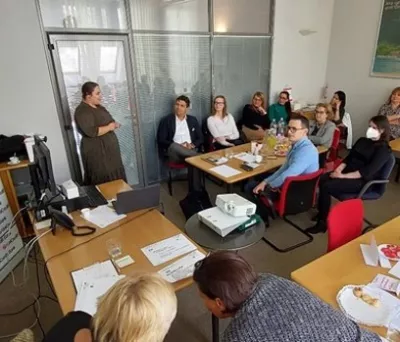Summary
The ‘DelFin’ project focused on four rural regions in central Europe to promote social entrepreneurship as a means of transforming these regions sustainably.
Key objectives included creating tailored financial instruments, fostering collaboration among local stakeholders, enhancing skills for innovation, and increasing support for social entrepreneurship.
Activities included tools development, pilot projects leading to the creation or scaling up of 11 social enterprises, capacity-building seminars with around 200 participants, and the creation of regional action plans and a transnational strategy.
The project also emphasised the need to raise awareness about social entrepreneurship in rural areas, particularly through a bottom-up approach. The ‘DelFin’ toolbox and methodologies offer practical resources for promoting social entrepreneurship. The project's adaptability and success make its lessons applicable across Europe.
Results
Based on the tools collected and developed by the project partners, the 'DelFin' toolbox for promoting social entrepreneurship in rural regions was created and made available online. This resource is intended for interested local and regional public authorities, business support organisations, development agencies and financial institutions.
To test the effectiveness of these tools, four pilot actions were carried out involving 43 social enterprises, of which 11 were able to launch or expand sustainable social businesses as a result of the pilot initiatives. To facilitate adoption of the tools, eight capacity-building seminars were organised. These seminars attracted 190 participants, representing 110 key stakeholders from the social enterprise ecosystems of the target regions.
Drawing from the results of the mapping, toolbox development, pilots and capacity-building activities, four regional action plans and one transnational strategy were developed. These aim to facilitate integration of the most promising solutions into mainstream practices, effectively promoting social entrepreneurship in rural regions.
Resources
Documents
Context
The DelFin project focused on four rural regions in central Europe: Saalekreis/Saxony-Anhalt in Germany, Hajdu-Bihar county in Hungary, the Piedmont region in Italy, and Duga-Resa/Karlovac County in Croatia. These regions face similar societal challenges, such as ageing, depopulation, brain drain, unemployment and the absence of basic and quality services.
As traditional public services often prove ineffective in addressing these issues, social innovation, including social entrepreneurship, is becoming increasingly important in facilitating the progressive economic transformation of rural regions and developing sustainable solutions. However, several sector-specific challenges, such as a lack of information and awareness, a shortage of skilled workers and management, the want of a business mindset, and insufficient funding, hinder the full realisation of social enterprises’ potential. To address these challenges, DelFin developed solutions to improve the financial ecosystems of social enterprises in rural areas.
Objectives
The DelFin project sought to unlock the potential of the rural social economy sector by:
-
Promoting social entrepreneurship in rural areas.
-
Creating financial instruments and funding options tailored for social enterprises.
-
Facilitating collaboration among local stakeholders within the financial ecosystem for rural social entrepreneurship.
-
Enhancing the skills and entrepreneurial competencies needed for economic and social innovation in central European regions.
- Increasing funding for business support structures that assist social entrepreneurship.
Activities, key actors, and timeline
In 2019, after identifying the challenges faced by communities and the social economy sector in the target regions, the DelFin partners recognised the project's need to address the requirements of social enterprises. The aim was to unlock the sector's potential in developing solutions for rural society's challenges.
To address these needs, by March 2020 the partners created tools to promote social entrepreneurship, with a specific focus on business support solutions, financing and funding schemes, as well as evaluation and impact measurement methodologies.To evaluate the most promising tools, pilot actions were carried out in each target region by October 2021.
Following the results of these pilot projects, by March 2022 capacity-building activities were conducted targeting public authorities and financial institutions. These were aimed at enhancing the capabilities of key stakeholders in promoting social entrepreneurship in rural areas. Finally, regional action plans and a transnational strategy were devised to help integrate the project's most promising accomplishments into mainstream practices.
Success factors/Lessons learnt
The project effectively applied the quadruple helix model which shows how four key groups (government, academia, industry and civil society) interact in a community to drive innovation and development. This approach proved vital in developing the necessary financial environment for social enterprises in remote rural regions.
Furthermore, the initiative highlighted the need for increased awareness of social enterprises and social entrepreneurship opportunities in rural areas due to the prevailing lack of knowledge. In smaller communities, especially those with a tradition of self-reliance, entrepreneurs often remain unaware that their ventures have social relevance. Consequently, they may not realise they are eligible for public policy support. To successfully mobilise the entire ecosystem and raise awareness of social entrepreneurship, it is imperative to adopt a bottom-up approach. This approach is the primary conclusion and a key success factor of this good practice.
To facilitate the bottom-up development of rural social enterprise ecosystems, it is recommended to use the DelFin toolbox, along with the methodologies and processes of action planning, pilots and capacity building. These resources have been collaboratively planned, tested and made accessible online by the DelFin partnership through the project's communication channels.
Given that DelFin was implemented in four different regions with cultural, experiential, governmental and geographical diversity, the lessons learned, conclusions drawn and methodologies applied and tested can be confidently adapted and mainstreamed across Europe.
Contacts
István Tamás Szenttamási, szenttamasi.tamas@ifka.hu

